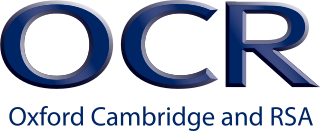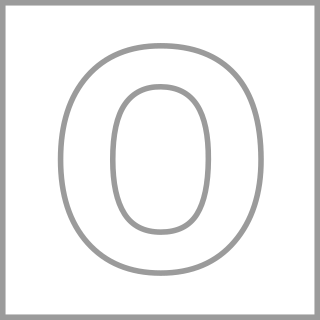Related Research Articles

The General Certificate of Secondary Education (GCSE) is an academic qualification in a range of particular subjects, taken in England, Wales, and Northern Ireland. State schools in Scotland use the Scottish Qualifications Certificate instead. Private schools in Scotland may choose to use GCSEs from England.
National Vocational Qualifications (NVQs) are practical work-based awards in England, Wales and Northern Ireland that are achieved through assessment and training. The regulatory framework supporting NVQs was withdrawn in 2015 and replaced by the Regulated Qualifications Framework (RQF), although the term "NVQ" may be used in RQF qualifications if they "are based on recognised occupational standards, work-based and/or simulated work-based assessment and where they confer occupational competence".
In the Scottish secondary education system, the Higher is one of the national school-leaving certificate exams and university entrance qualifications of the Scottish Qualifications Certificate (SQC) offered by the Scottish Qualifications Authority. It superseded the old Higher Grade on the Scottish Certificate of Education (SCE). Both are normally referred to simply as "Highers".

OCR is an examination board that sets examinations and awards qualifications. It is one of England, Wales and Northern Ireland's five main examination boards.
University of Cambridge Local Examinations Syndicate (UCLES) is a non-teaching department of the University of Cambridge, which operates under the brand name Cambridge Assessment, and is part of Cambridge University Press & Assessment. It provides educational assessments, which include the Oxford, Cambridge and RSA Examinations (OCR) examination board, Cambridge Assessment International Education, Cambridge Assessment Admissions Testing, and Cambridge Assessment English for learners of the English language.

The International General Certificate of Secondary Education (IGCSE) is an English language based secondary qualification similar to the GCSE and is recognised in the United Kingdom as being equivalent to the GCSE for the purposes of recognising prior attainment. It was developed by Cambridge Assessment International Education. The examination boards Edexcel, Learning Resource Network (LRN), and Oxford AQA also offer their own versions of International GCSEs. Students normally begin studying the syllabus at the beginning of Year 10 and take the test at the end of Year 11. However, in some international schools, students can begin studying the syllabus at the beginning of Year 9 and take the test at the end of Year 10.
A national qualifications framework (NQF) is a formal system describing qualifications. 47 countries participating in the Bologna Process are committed to producing a national qualifications framework. Other countries not part of this process also have national qualifications frameworks.
Free-standing Mathematics Qualifications (FSMQ) are a suite of mathematical qualifications available at levels 1 to 3 in the National Qualifications Framework – Foundation, Intermediate and Advanced.

The A-level is a subject-based qualification conferred as part of the General Certificate of Education, as well as a school leaving qualification offered by the educational bodies in the United Kingdom and the educational authorities of British Crown dependencies to students completing secondary or pre-university education. They were introduced in England and Wales in 1951 to replace the Higher School Certificate. The A-level permits students to have potential access to university if their grade is of satisfactory quality.

The O-Level is a subject-based qualification conferred as part of the General Certificate of Education. It began in the United Kingdom and has been adopted, often with modifications, in several other countries.
In the United Kingdom, an awarding body is an examination board which sets examinations and awards qualifications, such as GCSEs and A-levels. Additionally, these Awarding Bodies provide professional awards in the form of tertiary level Certificates, Diplomas, Advanced Diplomas, Graduate Diplomas, and Post Graduate Diplomas. There are eight main examination boards in the United Kingdom:
In the UK education sector, there are a wide range of qualification types offered by the United Kingdom awarding bodies. Qualifications range in size and type, can be academic, vocational or skills-related, and are grouped together into different levels of difficulty. In England, Wales and Northern Ireland, qualifications are divided into Higher Education qualifications, which are on the Framework for Higher Education Qualifications (FHEQ) and are awarded by bodies with degree awarding powers, and Regulated qualifications, which are on the Regulated Qualifications Framework (RQF) and are accredited by Ofqual in England, the Council for the Curriculum, Examinations and Assessment in Northern Ireland and Qualifications Wales in Wales. In Scotland, qualifications are divided into Higher Education qualifications, Scottish Qualifications Authority qualifications and Scottish Vocational Qualifications/Modern Apprenticeships, which are on the Scottish Credit and Qualifications Framework (SCQF). Scottish Higher Education Qualifications are on both the SCQF and the FHEQ.
Examination boards in the United Kingdom are the examination boards responsible for setting and awarding secondary education level qualifications, such as GCSEs, Standard Grades, A Levels, Highers and vocational qualifications, to students in the United Kingdom.
The General Certificate of Education (GCE) Advanced Level, or A Level, is a main school leaving qualification in England, Wales, Northern Ireland, the Channel Islands and the Isle of Man. It is available as an alternative qualification in other countries.
The Business and Technology Education Council (BTEC) is a provider of secondary school leaving qualifications and further education qualifications in England, Wales and Northern Ireland. Whilst the T in BTEC previously stood for Technical, according to the DFE (2016) it now stands for Technology. BTECs originated in 1984 and were awarded by Edexcel from 1996. Their origins lie in the Business Education Council, formed in 1974 to "rationalise and improve the relevance of sub-degree vocational education". They are the responsibility of the Minister of State for Skills, Apprenticeships and Higher Education in the Department for Education.
Extended Project Qualification (EPQ) is a qualification taken by some students in England and Wales, which is equivalent to 50% of an A-Level. Graded A*-E and worth up to 28 UCAS tariff points, it is part of level three of the national qualifications framework.
Cambridge Nationals are a vocational qualification in the United Kingdom introduced by the OCR Examinations Board to replace the OCR Nationals. These are Level 1 and Level 2 qualifications for students aged 14 to 16 and are usually a two-year course. Students can progress to A Levels, apprenticeships or Level 3 vocational qualifications.
Alternative pathways in education are alternative means of obtaining educational qualifications, other than the traditional means of gaining access to or completing the required study to obtain the educational qualifications.
In the United Kingdom, the Technical Level, or more commonly the Tech Level, is a school leaving qualification offered by educational bodies to students completing secondary or pre-university education. Tech-Levels are the vocational equivalent of the A-levels and is generally required for university entrance. Tech-Levels are generally worked towards over two years and split into a number of parts, with one part studied in each year. The first part is known as the Certificate Level. The second part is known as the Diploma Level and is more in-depth and rigorous than the Certificate Level. The Certificate Level is a qualification in its own right, and the Certificate Units combined with the Diploma units forms the complete Technical Level qualification. T Levels will offer students a mixture of classroom learning and 'on-the-job' experience during an industry placement of at least 315 hours.
The national qualification frameworks in the United Kingdom are qualifications frameworks that define and link the levels and credit values of different qualifications.
References
- ↑ "Cambridge Technicals". ocr.org.uk. Retrieved 14 March 2022.
- 1 2 "Cambridge Technicals". UCAS. 21 October 2014. Retrieved 14 March 2022.
- ↑ "Qualifications and Credit Framework (QCF)". www.accreditedqualifications.org.uk. Retrieved 14 March 2022.
- 1 2 "OCR Cambridge Technicals Applied Generals (reformed) | UCAS Qualification Information Profiles". qips.ucas.com. Retrieved 14 March 2022.
- ↑ "Vocational qualification reform plan". GOV.UK. Retrieved 14 March 2022.
- ↑ "Reforms to post-16 qualifications at level 3 in England". GOV.UK. Retrieved 14 March 2022.
- ↑ "Consultation decisions on vocational and technical qualifications (VTQs) and other general qualifications". ocr.org.uk. Retrieved 14 March 2022.
- ↑ "Proposed adaptations for Cambridge Nationals and Cambridge Technicals during 2021/22". ocr.org.uk. Retrieved 14 March 2022.
- ↑ "Cambridge Technicals Qualifications". Archived from the original on 28 February 2014. Retrieved 28 February 2014.